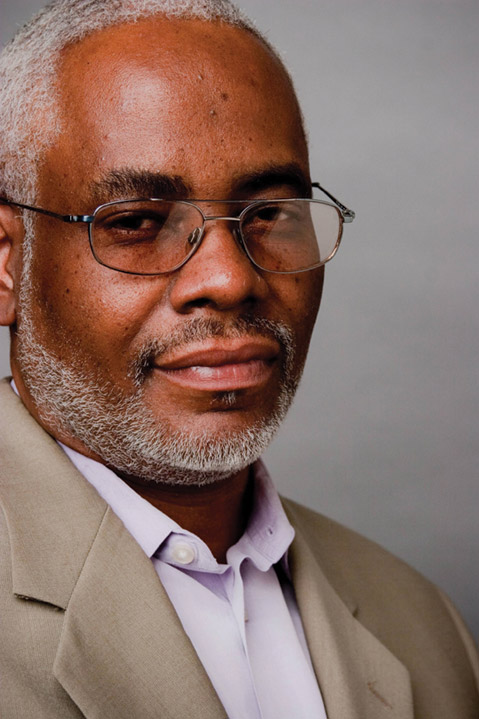Clyde Adrian Woods, 1957-2011
UCSB Black Studies Professor
Clyde A. Woods—friend, scholar, teacher, and community activist—passed away on July 6 at Cottage Hospital in Santa Barbara. A native of Baltimore, Clyde dedicated his life to understanding the nature of racial and class exploitation, to uncovering the humanity and dignity of black people, to fighting racism and poverty, and to working with all people committed to social justice. Much of Clyde’s early political convictions can be traced to his experiences in Baltimore, where he saw tremendous inequalities between whites and people of color, and to his beloved mother, Lena, a committed teacher and activist who stressed the importance of education.

After a stint in the newspaper business, Clyde enrolled in graduate school at UCLA, in the Department of Urban Planning, where he wrote a masterful dissertation that explored the Mississippi Delta. Clyde was particularly interested (obsessed, really) with the ability of the planter class to create a social structure and landscape that maintained its privilege and power.
It was during this research that he also began to explore the vernacular planning visions of poor African Americans as embodied in the musical form of the blues. This insight led to one of his greatest academic contributions: Development Arrested: Race, Power and the Blues in the Mississippi Delta (Verso, 1998). In a study that contributed to multiple academic disciplines, including all fields of ethnic studies, planning, geography, and history, Clyde argued that the planning hopes, desires, and aspirations of poor black people—who were never given a seat at the table of regional development—could be discerned through the blues.
Prior to this, few had ever considered or systematically analyzed the planning visions of African-American Southerners. This was a turning point in Clyde’s intellectual development, and he consistently remained attentive to the importance of black popular culture, especially music in all its forms, and its relationship to cities and regions.
Professor Woods, who was also acting director of the Center for Black Studies Research, began teaching at UCSB in 2005. As noted by Chancellor Henry Yang, “Dr. Woods was engaged in two long-term research projects within our Department of Black Studies, one focusing on rebuilding efforts in New Orleans and the other on creating a network of community members and scholars studying race and policy issues in the Los Angeles area. He was also actively involved in Haiti relief efforts; the recent earthquake in Haiti touched him deeply, and he was passionate about helping the people of Haiti.”
In addition to Development Arrested, Dr. Woods was the author of three other books, including the recently published In the Wake of Hurricane Katrina: New Paradigms and Social Visions (Johns Hopkins University Press, 2010); Black Geographies and the Politics of Place, coedited with Katherine McKittrick (South End Press, 2007); and Development Drowned and Reborn, a study of post-Katrina New Orleans that is currently under review by the University of California Press. At the time of his death, Woods was also working on a book with the working title Black California, and a new edition of Development Arrested.
As a teacher, Professor Woods had his own inimitable style. Famously crusty on the outside, he was all heart on the inside, especially for students who he saw were earnest and committed. Clyde was well-known for the high standards by which he measured student success, particularly in one-on-one instruction and graduate seminars. He was a master at one-on-one motivation of students of color who were sometimes ignored by others too busy to take an hour or two to change a life.
There are few professors more invested in the success of their students than Clyde was, and his colleagues held him in high esteem for his pedagogical approach to instruction. This commitment extended far beyond UCSB, as Professor Woods actively mentored students at other institutions, as well. His success in awakening student interest in such important topics as Katrina, Haiti, black California, black farmers, the educational and prison systems, and the politics of rural capitalization was unprecedented, for it outlined an intellectual practice of research-based teaching at the cutting edge of social science.
Clyde will be terribly missed by the colleagues, friends, cultural workers, and social activists with whom he worked, as well as by his son, Malik, of whom he was most proud. He leaves us with an incredible legacy of successful students and inspired scholars, as well as his own brilliant and inspiring scholarship deeply rooted in a commitment to social justice.
A service/celebration will be held at UCSB on Tuesday, August 9. A “second line” procession will begin at Storke Plaza at 11:30 a.m., and memorial festivities will continue at Corwin Pavilion from noon-3 p.m. Refreshments will be served.
Sonya Baker is an undergraduate advisor in the Chicana and Chicano Studies Department at UCSB. Gaye Theresa Johnson is a professor in UCSB’s Department of Black Studies.
Laura Pulido is a professor in the Department of American Studies and Ethnicity at the University of Southern California.



